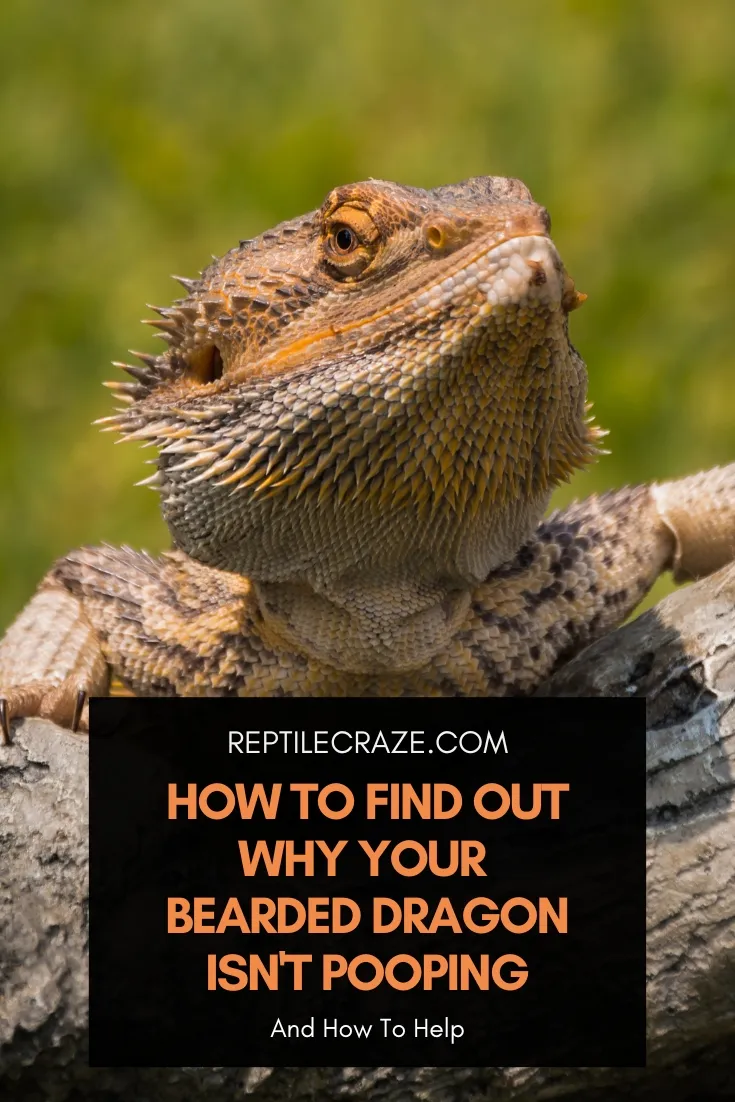
You are happy with your bearded dragon, until you notice the enclosure is clean -too clean- and you realize with horror that your pet has not had a bowel movement in some time. Now you are wondering if something could be wrong and why this could be happening.
Stress, dehydration, an unbalanced diet, brumation, pregnancy, and impaction are all possible causes of your bearded dragon’s not pooping. A warm bath will usually get rid of the problem but is not a definite solution. Furthermore, impaction can be life-threatening if not properly treated.
Keeping track of your bearded dragon’s bowel movements is essential to ensure he or she is happy and healthy. Let’s review what you can do to fix your bearded dragon’s problem, how to prevent it from happening again, and when to look for veterinary assistance.
Table of Contents
How Often Should Bearded Dragons Poop?
Here is a table that can quickly help you decide if you need to start worrying about your bearded dragon not pooping:
| Days without pooping | Baby | Juvenile | Adult |
| 1 day | Normal | Normal | Normal |
| 2 days | Not normal | Normal | Normal |
| 3 to 7 days | Not normal | Normal if reaching adulthood | Normal |
| More than 7 days | Not normal | Not normal | Not normal |
Your bearded dragon’s bowel movement frequency will depend on several factors, such as:
- Age
Baby bearded dragons are expected to poop a lot because of their faster metabolic rate. You can expect your baby beardie to poop around 1 to 3 times per day.
Juvenile beardies poop less often than babies, usually every 2 days, and they can poop even less often as they reach adulthood.
The poop schedule of adult bearded dragons can widely vary and is normal for some bearded dragons to poop as often as once per day or as infrequently as once per week.
- Diet
Bearded dragons that eat a calcium-rich diet (such as silkworms) will poop more often than beardies whose diet consists mostly of crickets, greens, and veggies.
- Heat and UVB/UVA exposure
Both UVB and UVA lights affect digestion. Make sure to guarantee your beardie has at least 10 to 12 hours of light exposure each day. Likewise, a cold enclosure will slow down your beardie’s digestion.
Remember that as all beardies are different, their digestive systems are different as well. Keep track of your pet’s poop schedule to figure out what is normal for them.
Tip: Read our guide on the best UVB bulbs for bearded dragons here!
Possible Reasons Why Your Beardie Is Not Pooping
Your beardie may not be pooping for several reasons. Here is a chart that can quickly help you figure out why your bearded dragon is not pooping as it should:
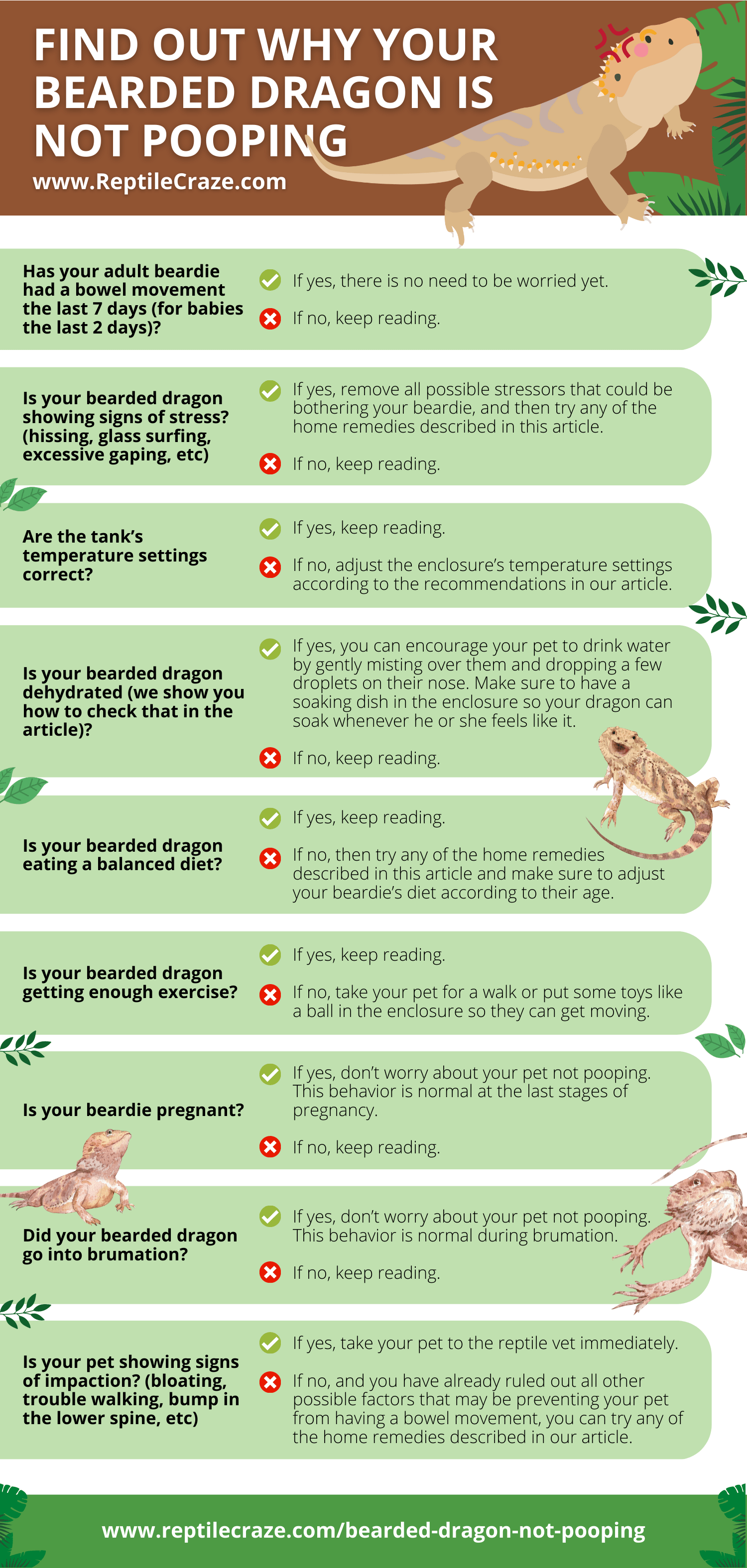
Now, let’s have a more in-depth look into these possible causes:
Stress
Bearded dragons can get stressed for many reasons, they are very sensitive creatures and any disbalance in their environment can affect them negatively.
When beardies are stressed, they may refuse
Stressing factors can include environmental issues such as wrong temperature settings, humidity imbalance, small enclosure, or having a tankmate that is making your beardie feel threatened.
Another -and often overlooked- stress factor may be due to constant changes of setup, especially when it happens frequently (a new change less than two months after the last change). This includes changes to the substrate.
Besides refusing
- Glass surfing (running along the sides of the enclosure while trying to climb the walls of the
tank ) - Continuous and prolonged gaping
- Digging
- Not basking
- Sluggishness
- Hissing
- Beard puffing
- Hiding all day
Incorrect Temperatures
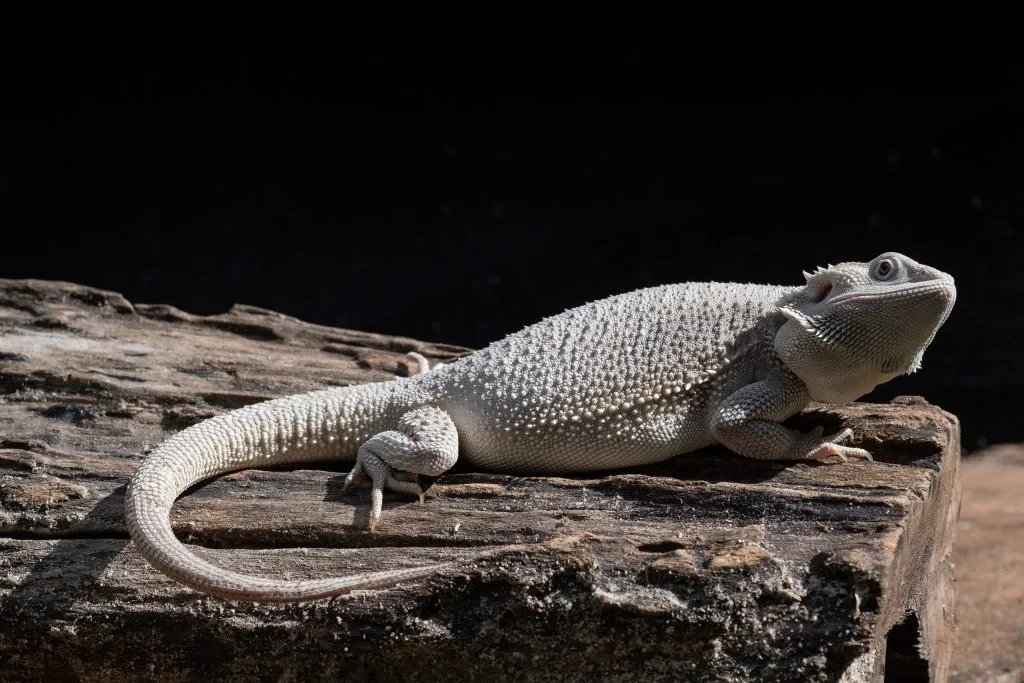
If the temperature in the enclosure is too high, your bearded dragon will feel hot and uncomfortable. He or she may start panting and this can lead to dehydration, which will only make matters worse.
If on the contrary, the temperature in the enclosure is too low, your bearded dragon won’t have as much energy as usual, its appetite will decrease and its digestion will also slow down.
Make sure to maintain proper temperature settings for your pet. Here is a table that summarizes the ideal temperature conditions for bearded dragons categorized by age group:
| Bearded dragon’s age | Basking area | Cool area |
| Baby | 100-110°F (37.7-43.3°C) | 80-90°F (26.6-32.2°C) |
| Juvenile | 95-100°F (35-37.7°C) | 75-80°F (23.8-26.6°C) |
| Adult | 95-100°F (35-37.7°C) | 75-80°F (23.8-26.6°C) |
Note that these temperatures are specifically for the basking area and cool area, not for the whole enclosure.
During the day, the average air temperature in the whole enclosure should range between 75.2-86°F (24-30°C). At night, the temperature for all age groups should be 70-75°F (21.1-23.8°C).
Did you know? Bearded dragon can overheat! Here are the signs for that and how you can help.
Dehydration
Although bearded dragons don’t need much water and they get most of it from their
Water is necessary to maintain a good digestive function; therefore, dehydrated bearded dragons won’t be able to poop as frequently.
Signs that your beardie is dehydrated include:
- Refusal to eat
- Lack of energy
- Sunken eyes
- Very wrinkled skin
If you suspect your beardie may be dehydrated, there is a simple yet reliable test that you can perform to see if that’s the case. It is called “the loose skin test”.
This test is done by gently picking up your beardie with one hand, and carefully but firmly pinching the skin of their back or side using your thumb and index fingers. Release the skin and notice how fast it goes back to normal.
If the skin stays “pinched” and goes back to normal but slowly, it means your beardie is dehydrated; but if it happens quickly and the skin does not stay pinched for more than a couple of seconds, it means your beardie is well hydrated.
Bearded dragons prefer moving water, so just leaving a water bowl inside the enclosure won’t do anything to prevent your pet from dehydration. Get a small fountain to encourage your beardie to drink water.
Note: If your bearded dragon is showing several signs of illness, you should read this article. Your beardie might be dying.
Having Too Little Or Too Much Food
If your bearded dragon is not eating as much as it should, then he or she won’t have much waste to get rid of.
On the other side, if they eat too much, they can become overweight and start having digestive issues as a result.
Remember that baby and juvenile beardies are mostly insectivorous and eat two to three times per day, while adult beardies are predominantly herbivorous and should eat every 24 to 48 hours.
Laziness
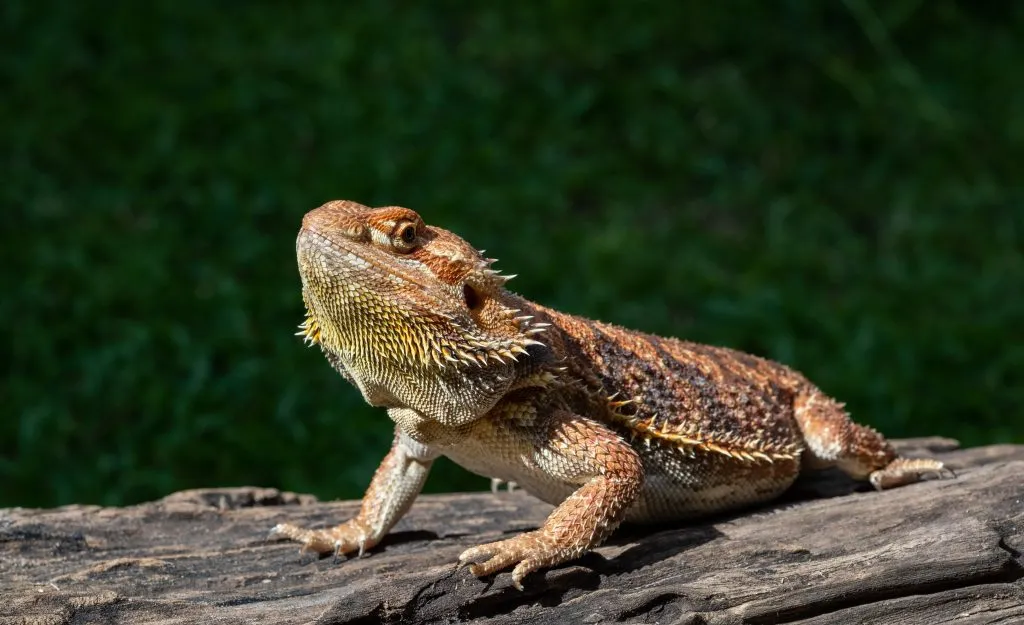
We get it, some bearded dragons can be a little bit lazy, especially when they tend to be on the overweight side of the scale.
However, sedentary bearded dragons can have digestive issues as they won’t be able to digest their
Brumation and Pregnancy
It is normal for beardies to not eat -and therefore to not poop- during brumation, and in the case of females, during the last stages of pregnancy.
If your beardie is eating a little and still not pooping, you can soak them every 10 to 14 days to help activate their digestive system.
Impaction
Impaction means there is poop build-up in your bearded dragon’s digestive system. Unfortunately, this is a common and serious cause for beardies not pooping.
Signs of impaction can include:
- Lack of energy
- Sudden weight gain
- Bloating
- Regurgitation
- Trouble walking
- Loss of function of the back legs
- Bump in the lower spine
Impaction can be caused by a diet imbalance, improper temperature settings, or inadequate substrate.
Beardies who are not being properly fed can suffer from mineral deficiency (usually calcium), thus they will try to compensate for this lack of minerals by eating loose substrate such as sand, gravel, or soil. The problem is that loose substrate can cause impaction.
You can prevent this by providing sepia bones in a little bowl so that your pet doesn’t have to resort to eating substrate to get their minerals.
Impaction can be life-threatening if not addressed promptly. If you suspect your beardie may have impaction, please reach out to a reptile vet immediately.
What Can You Do To Help Your Beardie Poop?
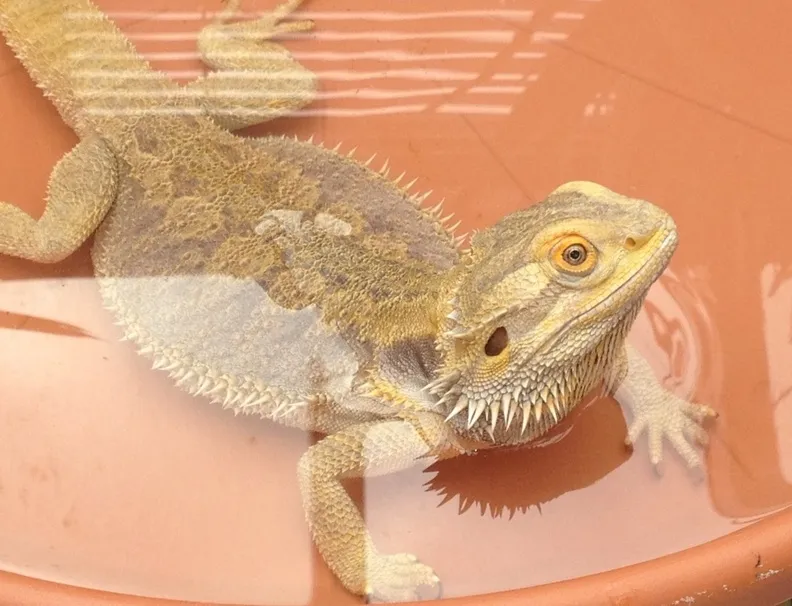
The good news is that there is a lot you can do to help your bearded dragon poop. Let’s review some of the most common home remedies you can try to help your pet get a bowel movement:
Give Them A Nice Warm Bath
This is the go-to solution for most bearded dragon owners. A 100°F (37.7°C) warm bath will usually activate your beardie’s digestive system and make them poop.
You can also try giving your pet a belly massage as well, rubbing your fingers gently toward the beardie’s vent.
Baths should not be given often to bearded dragons.
Keep in mind that doing so every time your beardie has trouble pooping can be counterproductive, as they may end up getting used to this schedule and holding their poop until they find water they can defecate in.
Put Some Olive Oil On Their Food
If a warm bath didn’t work, or you just don’t want your pet to get used to having baths to poop, you can try dipping some insects in olive oil before feeding them to your bearded dragon.
The oil will work as lubrication for the poop to pass on more easily.
Feed Them Some Fruit Laxatives
A high-fiber fruit puree can be used as a laxative to help your bearded dragon get his digestive system going.
You can use a syringe to feed your pet 1 ml of applesauce, banana, or pumpkin puree.
Take Them For a Walk
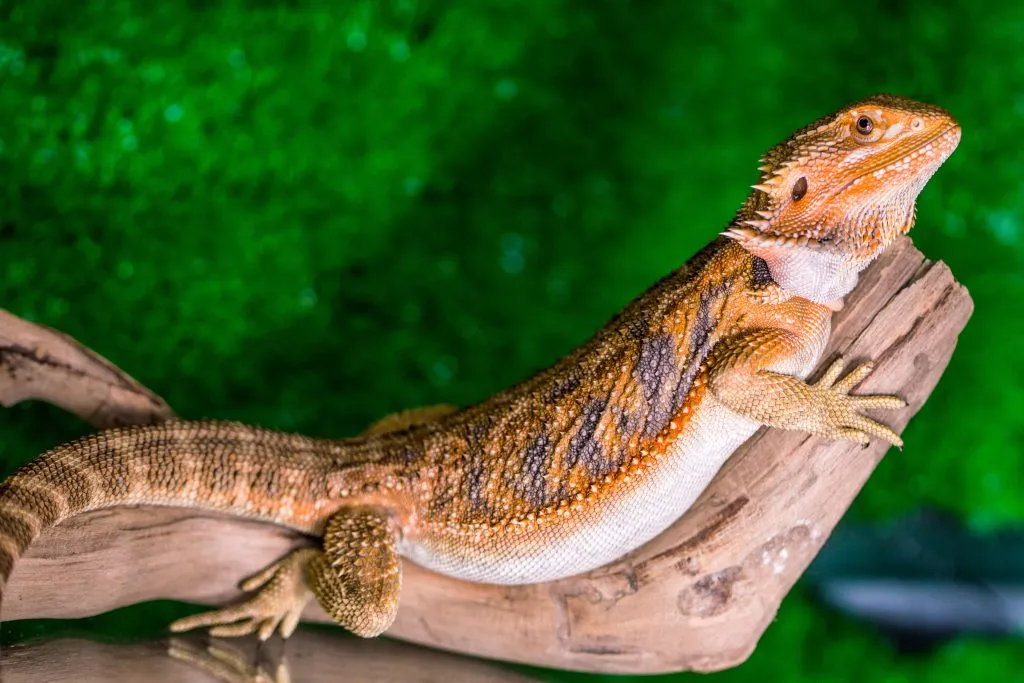
Activity is good to keep a healthy digestion process. Take your beardie for a walk or try to encourage them to move by putting toys in the enclosure.
Help Them Relax
Always make sure your beardie is as relaxed as possible.
Keep proper temperature and humidity levels in the enclosure and be aware of any additional stressing factors that may be causing your beardie to not poop.
When To See A Vet
If you tried all the home remedies described above and your pet hasn’t pooped yet, then it might be time to take your beardie to the reptile veterinarian.
Impaction can happen at any time, and it may cause serious harm to your pet’s digestive system.
When left untreated, impaction can even lead to your beardie’s death.
If you see signs of impaction, or if you are not sure about how long your pet hasn’t been pooping, is better to err on the safe side and take your beardie to the vet immediately.
- Enchi Ball Python: A Unique and Stunning Morph of Python regius - March 27, 2025
- Emerald Tree Monitor: The Enigmatic Green Guardian of the Rainforest - March 26, 2025
- The Egyptian Cobra (Naja haje): A Fascinating Serpent - March 25, 2025
